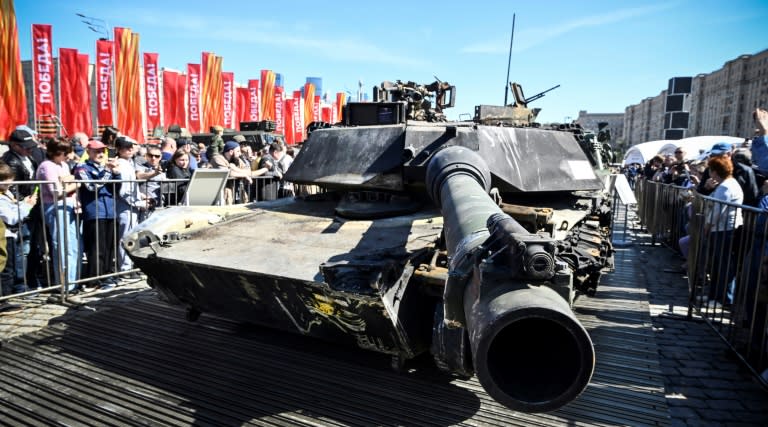Faced with 'trophies' from Ukraine, Russians feel pride and fear

Armoured vehicles from a dozen NATO countries, drones, rocket launchers: a crowd flocked to Moscow's Victory Park Wednesday to see military "trophies" brought back from Ukrainian battlefields.
On a sunny May 1, a public holiday, families and couples came to see weapons such as a damaged US-made tank, on the opening day of a show organised by the army.
More than two years into Russia's Ukraine offensive, the mood was one of admiration and patriotism -- but also of fear in the face of a dragging conflict with no end in sight.
Around 40 military vehicles of all sizes were on display. Among the most photographed were a seriously damaged US Abrams tank, a German Leopard 1 and a French AMX-10.
The army did not say where exactly they were captured -- or at what cost -- only that they came from Russian-occupied eastern and southern Ukraine.
The location for the show was symbolically chosen: in the capital's Victory Park, a grand space dedicated to defeating the Nazis.
Moscow has throughout its Ukraine campaign compared its offensive to the Soviet war effort in WWII -- telling Russians it is fighting a similar enemy to 80 years ago.
- 'They are winning' -
One of the military men guiding visitors, Andrei Lyubchikov, was keen to stress that comparison.
He said the show aimed to "show that -- like in the Second World War -- our fighters are resisting in the face of the West and its technology."
"They are winning."
The show came as Moscow has made some gains in eastern Ukraine.
It was also held ahead of May 9 celebrations, when Russia marks the victory over the Nazis in what has become central to President Vladimir Putin's long rule.
The Kremlin has promoted the comparison to WWII while not tolerating any criticism of its offensive.
Many who came to the show in Victory Park were receptive to this narrative.
Dmitry Pervukhin, 75, regretted that Moscow did not act more "decisively" against "the Ukrainian Nazis" in 2014 -- the year Russia annexed Crimea after a pro-Western revolution in Kyiv.
But the retired military man was reassured that Russian troops can seize Western tanks.
"It means we can fight them," he said.
- Worry -
But while the visitors of the show AFP spoke to were fervent supporters of the Ukraine campaign, some did not hide their worry over a "special military operation" that has dragged on for more than two years and in which authorities do not provide a death toll.
Denis Donskoy, a 21-year-old science student, said he felt a mix of "admiration and fear" while seeing the conquered vehicles.
"When I see that, I admire our soldiers, their bravery, their will.. But I also worry about their lives," he said.
"I hope it will all end well."
In Moscow, the conflict in Ukraine can often seem distant, with authorities promoting a business-as-usual approach in the mega-city.
For Alexei, an IT engineer, seeing the tanks made the conflict more real than what is shown on TV and social media.
"It's terrible to see a weapon like this, that advances, that shoots," the 29-year-old, who preferred not to give his last name, said.
Parents Marina and Andrei Novik-Zolotov, who came with their children aged four and 11, had smiles on their faces -- but were also worried.
Marina, 34, described herself as a "patriot" and believed Russian soldiers are "continuing to fight against fascism."
"But it is still a war, it is hard, people are dying," she added.
Her husband, 37-year-old Andrei, said he found the show "frightening" but believed it was "important to show people that the war is not distance, but very close."
Both were convinced the conflict was nowhere near an end.
"We are not talking about a year, or two, or five. It is for a very long time," the father-of-two said.
bur/yad

 Yahoo News
Yahoo News 
